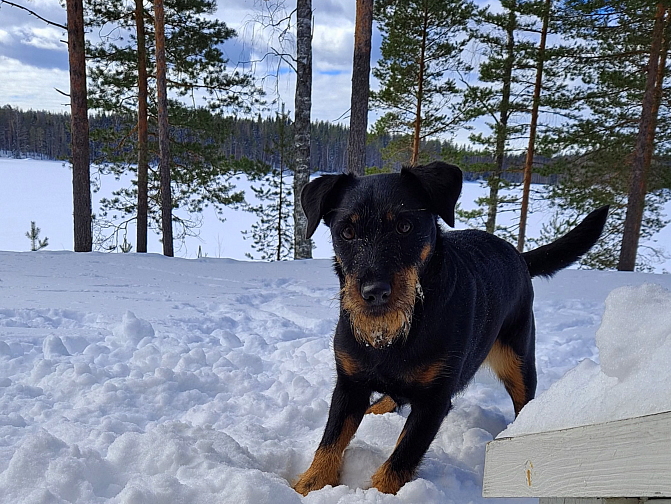
An expert study provides recommendations for the development of legislation on dog breeding
On this page
The Natural Resources Institute Finland (Luke) in cooperation with the Ministry of Agriculture and Forestry and the Finnish Food Authority conducted an expert study on problems involving dog breeding and welfare. The study sought to develop legislation and build practical tools for the supervision of animal welfare to deal more easily with any breeding that causes genetic disorders and abnormalities.
Several disorders and abnormalities that have an adverse impact on animal welfare are associated with the structure of dogs, which may be a desired trait despite any drawbacks. Maintaining serious extreme traits and abnormalities that cause significant welfare harm, including excessively short legs and short noses, through breeding can be considered to be in breach of Finland’s current animal welfare legislation.


The Ministry of Agriculture and Forestry is preparing a new animal breeding decree – more detailed regulation on animal breeding
Based on studies, the Ministry of Agriculture and Forestry is preparing a Government decree on animal breeding. The decree will clarify the limit between permitted and prohibited breeding, as well as act as a guideline for the supervisory authorities that enforce legislation.
Based on the study, the genetic extreme traits, abnormalities and disorders, as well as the number of C-sections for which veterinarians must submit a report and breeding prohibition to the Dog Registry will be specified in the decree.
Tools for the animal welfare authorities
The criteria and threshold values defined for the supervision of breeding in the study are tools that will be used by the supervisory animal welfare authorities. These criteria are intended for situations in which the authorities must assess whether breeding activities are in breach of animal welfare legislation. The first court proceedings in which these tools are required are already in progress.
The Finnish Kennel Club has addressed the studies in its breeding strategy, in which health has been defined as the most significant breeding goal over other traits. Many breed associations have updated their genetic abnormality and disorder prevention programme (PEVISA) in line with the guidelines of the new animal welfare legislation. In place of bans on certain breeds, Finland is leading the way in cross-breeding, and the Finnish Kennel Club has approved several cross-breeding projects of breed associations for breeds with health problems.
Awareness of health problems also shapes attitudes – popularity of short-nosed breeds has decreased
Awareness of dog breeding problems has increased significantly as a result of extensive news, education, training and communication. The animal welfare authorities and organisations, as well as various breed associations are still waiting for the breeding decree to enter into force before taking any concrete action. However, attitudes have already changed which can be seen as a decrease in the popularity of short-nosed breeds.
In the long term, it is expected that there will be fewer problems caused by breeding and that the animal welfare authorities can deal with problems more easily. “In the future, certain breeds may cease to exist or look different, while being healthier – anyway, we will still keep dogs as pets in our homes,” says Saara Kupsala, Animal Welfare Ombudsman (memorandum, 28 November 2023).
